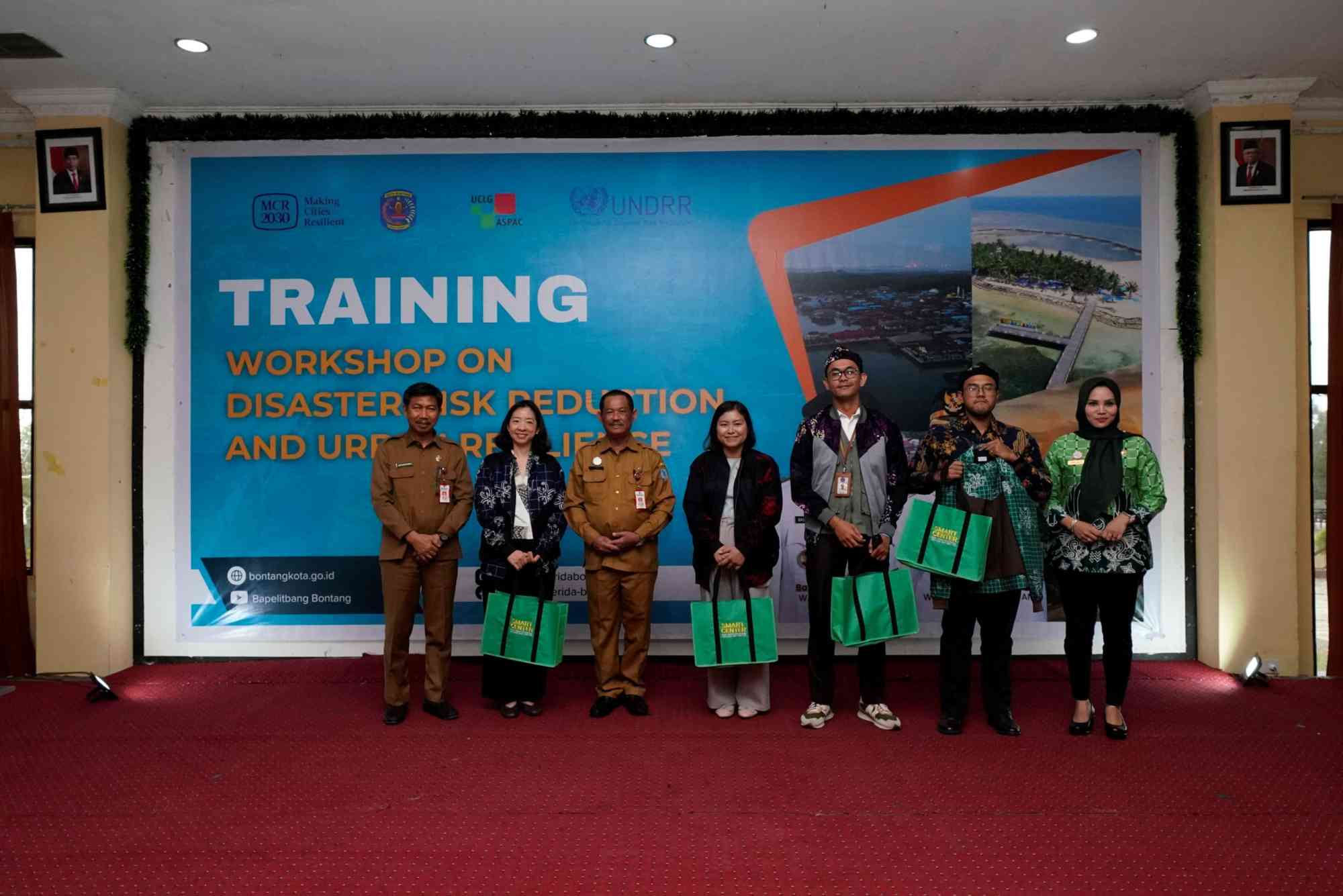Training Workshop on Disaster Risk Reduction and Urban Resilience in Bontang City
UCLG ASPAC received a request from its member, Bontang City to support the city’s disaster risk reduction and urban resilience efforts. In collaboration with the UNDRR, BNPB, and MoHA of Indonesia, UCLG ASPAC organised a training on DRR and Urban Resilience in Bontang on April 29-30, 2024.
Description
Local governments are on the ‘frontline of opportunity’ to reducing impact of disasters – keep people out of poverty; protect hard-earned local development gains; and enable municipalities to become more inclusive, safe, resilient, and sustainable. Challenged by climate emergency, pandemic, and other shocks and stresses, resilience building can no longer be a stand-alone issue and must take into consideration the inter-dependencies between sectors, the interconnectedness of socio-economic factors, and the complexity of hazards. Cities must take a long-term approach to reduce risks and must make resilience building an integral part of urban development.
To make this happens, local government actors involved need guidance and support to enhance their understanding on disaster risk reduction and resilience to improve strategic planning and to take action and progress along the resilience road map. To mitigate the potential risks, we must increase the level of capacity trough adaptation approach on climate type hazards and disaster.
Further, United Cities and Local Government Asia Pacific (UCLG ASPAC) has been actively promoting the advocacy on Making Cities Resilient (MCR2030) in partnership with United Nations Office for Disaster Risk Reduction (UNDRR). The MCR2030 has been one of the active platforms for promoting and mainstreaming the Sendai Framework for DRR at the local level.
Earlier this year, Bontang City requested to UCLG ASPAC and UNDRR to have a training on DRR to deepen and explore more potential collaboration in the MCR 2030 since their participation since April 2022. In response to this, UCLG ASPAC, UNDRR, and BNPB organised a Training Workshop on Disaster Risk Reduction and Urban Resilience held in Bontang 29-30 April 2024.
The workshop served as an orientation on local disaster risk reduction and urban resilience for key stakeholders by supporting the cities in understanding their existing condition through the lens of Disaster Resilience Scorecard. The workshop was attended by 40 participants from multi-stakeholder backgrounds.
Did the Sendai Framework change or contribute to changes in your activities/organization? If so, how?
As a local government association, UCLG ASPAC is to serve its member cities as a key knowledge hub on all local government issues in the Asia-Pacific region. It enables collaboration between cities, local governments and their associations, and it encourages democratic local governance.
It also makes partnerships, networks, and programmes to build capacity of local governments and its associations possible. Additionally, UCLG ASPAC advocates for local governments politically within the international community, including with the UN and its agencies.
Furthermore, UCLG ASPAC also supports LGs in several thematic fields, including DRR and Resilience which is inline with Sendai Framework for DRR.
What led you to make this commitment/initiative?
What was your position before making this Voluntary Commitment / prior to the Sendai Framework?
As a local government association, UCLG ASPAC is to serve its member cities as a key knowledge hub on all local government issues in the Asia-Pacific region. It enables collaboration between cities, local governments and their associations, and it encourages democratic local governance.
It also makes partnerships, networks, and programmes to build capacity of local governments and its associations possible. Additionally, UCLG ASPAC advocates for local governments politically within the international community, including with the UN and its agencies.
Furthermore, UCLG ASPAC supports inclusive societies that uphold social and economic justice, equality, and sustainable development. The local economic development, climate change, disaster resiliency, culture, strategic planning, decentralisation, municipal finance, gender equality, women’s leadership and environment, and good governance, are all the thematic fields in which UCLG ASPAC is actively involved.
As LGs and Cities in the central of our concerns, the capacity building of UCLG ASPAC members become one of our main core activities. Including capacity building in the DRR and Resilience Aspects
Deliverables and Progress report
Deliverables
Deliverables are the end-products of the initiative/commitment, which can include issuance of publications or knowledge products, outcomes of workshops, training programs, videos, links, photographs, etc.
The report on the training/capacity building conducted.
The overall score for Bontang based on the assessment is 85/141.
Top 3 Scores:
- Essential 4: Pursue resilient urban development and design: 10/12 or 83.33%.
- Essential 6: Strengthen Institutional Capacity for Resilience: 13/18 or 72.22%.
- Essential 9: Ensure Effective Disaster Response: 15/21 or 71.43%.
Top 3 Priorities to be improved:
- Essential 7: Understand and Strengthen Societal Capacity for Resilience with a score of 6/21 or 28.57%.
- Essential 10: Expedite Recovery and Build Back Better might be considered as one of the priorities with a score of 2/6 or 33.33%.
- Essential 1: Organise for Resilience, with a score of 4/9 or 44.44%.
From the score 85/141, it is concluded that Bontang’s condition is conducive, yet needs improvement. City stakeholders can use the findings above for better disaster management plans in the future. UCLG ASPAC and UNDRR also endorsed the city’s plan to establish a task force/Working Group (Kelompok Kerja/Pokja) to improve the city’s resilience.
Organizations and focal points
Implementing Organization(s)
Focal points
Partners
